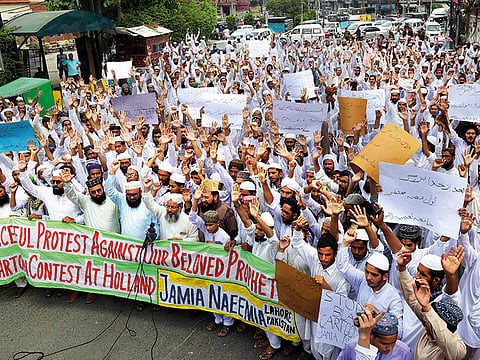Prophet cartoon contest in Netherlands sparks Pakistan protests
Islamist party leader says ‘only jihad’ is sufficient to punish ‘blasphemous’

Islamabad: Hundreds of Islamists were marching on Islamabad on Wednesday to demand that Imran Khan’s new government sever diplomatic ties with the Netherlands over a “blasphemous” cartoon competition.
The protest march, organised by Tehreek-e-Labbaik (TLP), a political party dedicated to the punishment of blasphemy, presents the first major test of Khan’s Pakistan Tehreek-e-Insaf (PTI) administration. Last year a similar protest by the TLP shut down the capital for almost a month.
In June, Geert Wilders, the anti-Islam MP who leads the country’s second largest party and has been found guilty of inciting hatred, invited submissions of cartoons depicting Prophet Mohammad (PBUH), which Islam forbids. The $10,000 (Dh36,700) competition is due to open in November, with 200 entries so far.
“We can be martyred or arrested,” said one of the TLP’s leaders, Peer Afzal Qadri, “but we will not return until either the cartoon contest is stopped or the Dutch envoy is expelled.”
The march will begin in Lahore and end at an unspecified location in the federal capital.
Khadim Rizvi, the firebrand cleric who founded the TLP, said that condemnation of the contest by the Pakistani government was not enough and “only jihad” was the solution.
Before Pakistan’s general election last month, Rizvi said if he had the power he would order a nuclear strike against the Netherlands if its government allowed the competition to go ahead.
The Dutch prime minister, Mark Rutte, has termed the event “disrespectful” but defended the right to hold it on the grounds of freedom of expression.
On Monday Pakistan’s senate passed a resolution condemning the competition and Khan vowed to take up the issue at the UN General Assembly in September. He said Islamic countries should cooperate to create laws against blasphemy similar to those against Holocaust denial in European countries.
“If they [Western countries] feel pained discussing the Holocaust, why haven’t we been able to convey to the west how much we feel pained when they do blasphemous things against Islam and our beloved Holy Prophet, peace be upon him?” said Khan.
The TLP knows how to force the government’s hand. For three weeks in November, Rizvi and around 2,000 followers blockaded a motorway between Islamabad and its sister city, Rawalpindi, over minor adjustments to an election oath they declared blasphemous. The army eventually brokered a deal with the government, which included the dismissal of the law minister, Zahid Hamid, and several further concessions.
The protest puts Khan in a difficult position, analysts said, as during the run-up to the election he was using the “same kind of rhetoric” on blasphemy as the TLP.
Fasi Zaka told the Guardian that the “question is whether he treats [the TLP] with kid gloves”, as the previous administration did, or sets a timeline for the protest and prevents a similar gathering on a public motorway. There is some irony to the current face-off, Zaka added, as Khan’s popularisation of lengthy street protests likely provided some inspiration to the TLP.
Sign up for the Daily Briefing
Get the latest news and updates straight to your inbox



